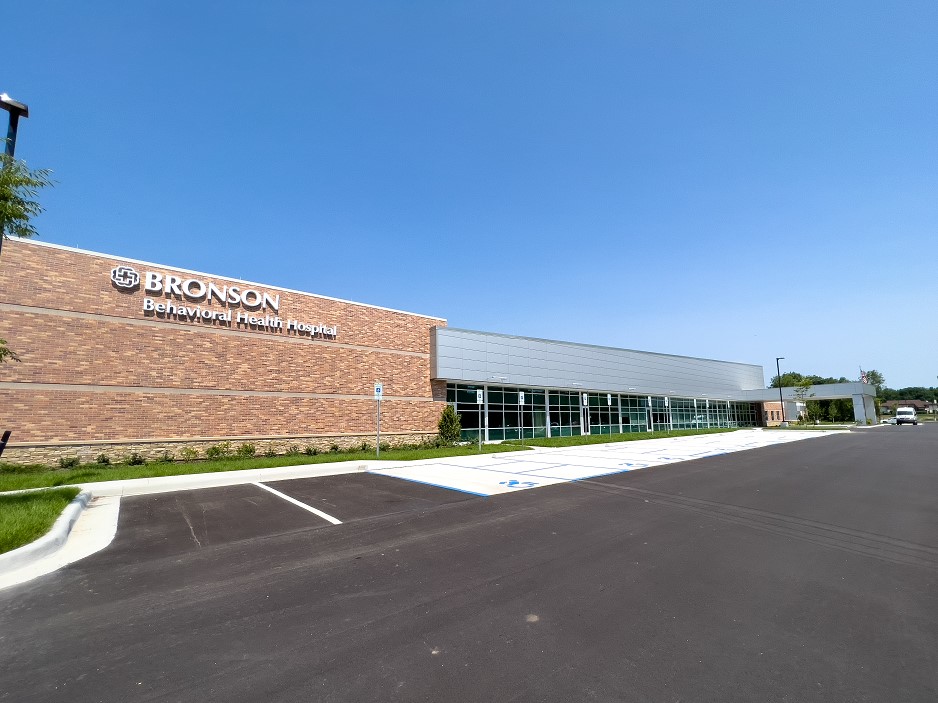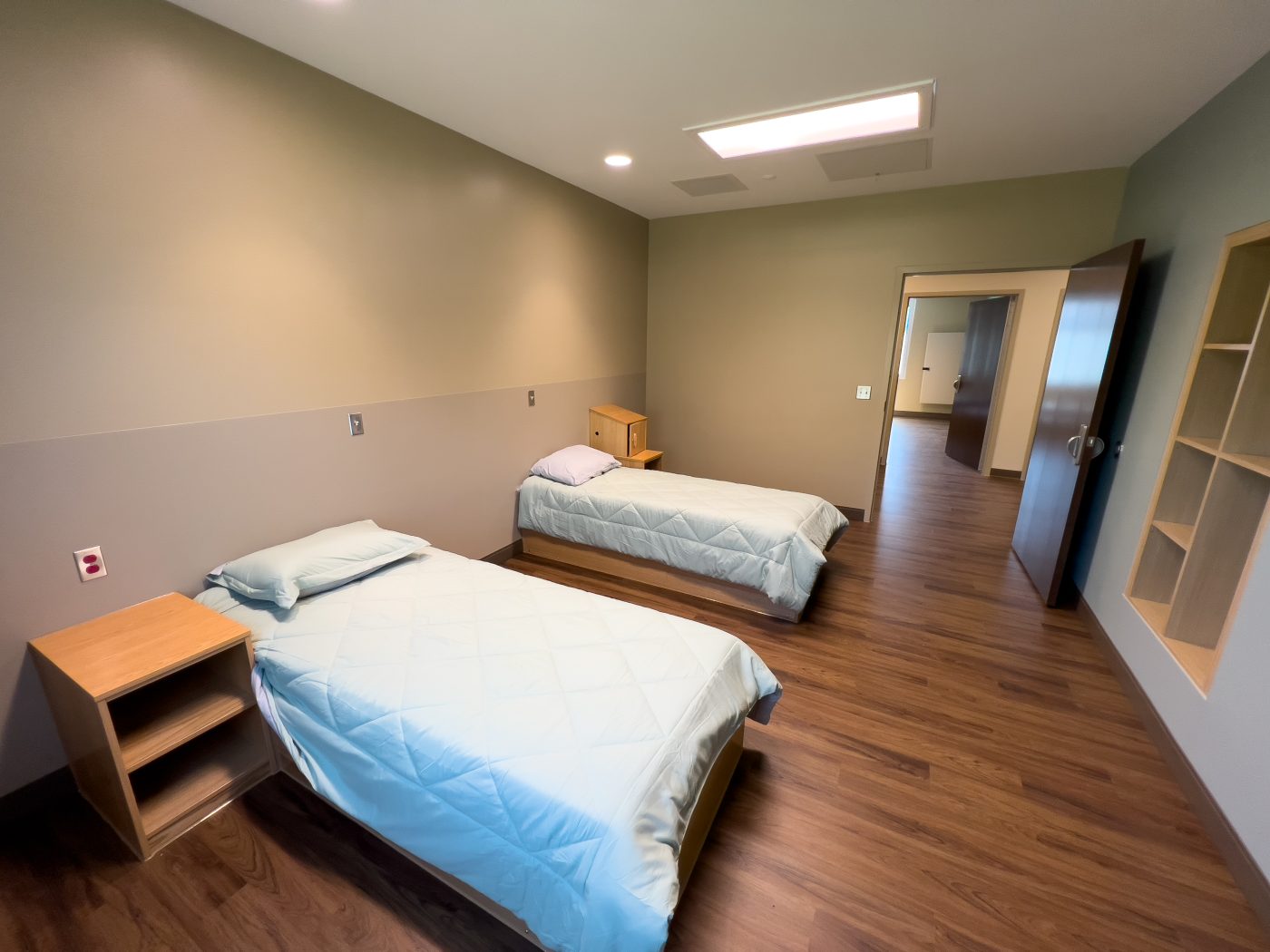Self-harm refers to the deliberate act of causing physical harm or injury to yourself, typically as a way to cope with emotional distress or as a means of self-punishment. People who are struggling with self-harm might feel a sense of relief or comfort from these behaviors. However, self-harm is not a healthy or effective long-term coping strategy and can have serious physical and psychological consequences.
At Bronson Behavioral Health Hospital, located in Battle Creek, Michigan, we help adults age 18 and older who need immediate stabilization and support for self-harm. Our safe and secure inpatient treatment center provides an intensive therapeutic environment where people can learn healthy emotion regulation skills and explore underlying mental health concerns that may contribute to self-harm behaviors.
Common Signs & Symptoms of Self-Harm
Self-harm, also known as nonsuicidal self-injury, can look different from person to person. Common signs that someone might be engaging in self-harming behaviors include:
- Unexplained injuries: The person may have unexplained cuts, burns, and bruises, often in repetitive patterns or on the same body areas.
- Frequently wearing long sleeves: People who are self-harming may consistently wear clothing that conceals their body, even in warm weather, to hide self-inflicted wounds.
- Presence of sharp objects or tools: Someone who self-harms might own items like razors, knives, and other sharp objects that may not have any practical use.
- Scars or marks: They may have visible scars and marks, particularly in areas that are easily hidden, like the inner forearm, upper thighs, and stomach.
- Emotional withdrawal and isolation: Someone who self-harms might withdraw from social situations, isolate themselves from friends or family, and demonstrate changes in their behavior.
- Expression of emotional distress: They might frequently talk about feeling overwhelmed and hopeless and experiencing intense emotions.
- Signs of depression and anxiety: Symptoms such as persistent sadness, irritability, changes in appetite and sleep patterns, and a decline in academic or work performance may be present in someone who self-harms.
- Difficulties in interpersonal relationships: They may have difficulties forming or maintaining healthy relationships due to persistent feelings of shame and guilt and fear of judgment.
- Signs of low self-esteem: They may have low self-worth, negative self-talk, shame, and a distorted body image.
Emotional symptoms of self-harm can also be evident. Common symptoms of self-harm that someone might experience include:
- Intense emotional distress
- Difficulty regulating emotions
- Self-loathing
- Guilt and shame
- Emotional numbness
- Hopelessness and despair
- Low self-esteem
Although self-harm is not a clinical mental health disorder, it often accompanies common mental health disorders such as depression, anxiety, obsessive-compulsive disorder (OCD), and posttraumatic stress disorder (PTSD). Self-harm is usually a sign of underlying emotional pain, mental health struggles, and difficulties managing intense feelings.
Self-Harm Statistics & Risk Factors
Self-harm affects people of all ages and backgrounds. According to the Centers for Disease Control and Prevention (CDC), in 2020, there were 187,000 self-harm-related emergency department visits in the U.S. This highlights the urgent need for self-harm awareness, prevention, and practical support for people who are struggling with self-harming behaviors.
A study in Frontiers of Psychology reported the following statistics regarding self-harm:
- The average age of onset for self-harm is between 12 and 14.
- Women are more likely than men to engage in self-harm.
- Self-injurious behaviors often occur alongside other mental health disorders, such as borderline personality disorder (BPD), OCD, anxiety and mood disorders, substance use disorders, and some eating disorders.
- Self-harm affects members of all races, but people of multiracial backgrounds suffer at higher rates.
- There is a strong connection between childhood trauma and developing self-harming behaviors in adulthood.
Self-harm is a widespread concern. Unfortunately, self-harm is often underreported due to secrecy, shame, and fear of judgment. If you or someone you love self-harms, there is help available, and you do not have to continue to suffer alone.
Potential Effects of Self-Harm
Self-harm can cause many physical and emotional effects and, if left untreated, can escalate in severity. Without professional intervention, self-harm can lead to more severe injuries or accidental life-threatening harm.
Effects of self-harm may include:
- Physical injuries: Self-harming behaviors can result in cuts, burns, bruises, scars, and other forms of physical harm to the body. These injuries may require medical attention, leave permanent marks, and pose a risk for infection.
- Long-term scarring: Repetitive self-harm, like cutting, can lead to visible scars and marks on the body that may last forever.
- Relationship strain: Engaging in self-harm can impact relationships by causing tension, misunderstanding, and concern among friends and family who may struggle to understand. Extreme privacy often accompanies self-harm, which can further isolate people from their loved ones.
- Emotional distress: Although self-harm may temporarily alleviate emotional pain, it often perpetuates a cycle of despair. Feelings of guilt, shame, and self-loathing can intensify, contributing to a decline in overall emotional well-being.
At Bronson Behavioral Health Hospital, our team of highly trained professionals provides interventions, therapies, and comprehensive support for people who are struggling with self-harm. Our acute inpatient treatment center can help people address any underlying emotional turmoil and develop healthier coping mechanisms for navigating life’s challenges.
Therapies Offered at Our Self-Harm Treatment Center
Taking the first step to pursue mental health treatment requires courage. By receiving self-harm treatment, people who self-harm can learn how to break the cycle of self-destructive behaviors and find healthier ways to cope with emotional distress. Effective treatment can improve overall well-being and promote a higher quality of life.
At Bronson Behavioral Health Hospital, we offer evidence-based therapies and round-the-clock support for people who are struggling with acute self-harm behaviors. Features of our inpatient self-harm treatment center include:
- 24/7 supervision: Self-harming behaviors can pose a serious risk to someone’s safety. At Bronson, we provide round-the-clock care, and our trained staff is available for self-harm attempts or emergencies. In our nurturing environment, patients can establish a sense of trust with the treatment team and benefit from a consistent and structured approach to their care.
- Individual therapy: By receiving individual therapy, people who are struggling with self-harm can get tailored support and guidance that is aimed at addressing the root causes and triggers of self-harming behaviors. This personalized approach can help people work through mental health challenges in a supportive and empathetic environment. In individual therapy, people who self-harm have a safe and confidential space to explore their emotions, thought patterns, and past experiences. Sessions are guided by licensed social workers and licensed professional counselors who are trained in cognitive behavioral therapy (CBT).
- Family therapy: Family therapy can be a valuable tool for helping people who struggle with self-harm. Family therapy offers the opportunity for family members to share concerns, emotions, and questions related to self-harm. This can strengthen family relationships and improve family dynamics.
- Group therapy: Most people participate in group therapy sessions each day while in treatment. Group therapy at Bronson is led by therapists, nurses, recreational therapists, and behavioral health technicians. These groups offer a supportive and nonjudgmental environment where people who self-harm can connect with others who share similar experiences. In group therapy, people can share their stories, learn from others, and build social skills.
- Medication management: If a patient at our inpatient self-harm treatment center needs to take medication as part of their individualized treatment plan, they may meet with a licensed psychiatrist or psychiatric nurse practitioner every day for medication management services.
At Bronson Behavioral Health Hospital, we integrate cognitive behavioral therapy into all our treatments. CBT can help people gain valuable insights into the thoughts, emotions, and triggers that can contribute to self-harming behaviors. Our dedicated team of therapists is committed to helping people identify and then confront these negative thoughts and beliefs. We strive to empower those who self-harm to cultivate a more optimistic mindset so that they can approach future emotional challenges with positivity.
Why Choose Inpatient Self-Harm Treatment
At Bronson Behavioral Health Hospital, our inpatient self-harm treatment can help people pursue lifelong healing from self-harm. Our state-of-the-art, 96-bed facility in southwestern Michigan is staffed by a team of compassionate and experienced mental health professionals who are dedicated to providing comprehensive care. By learning about underlying factors that may contribute to self-harming behaviors, people can begin to understand why they self-harm and how they can find freedom.
Seeking professional help is a crucial first step toward a life that is not defined by self-harm. By choosing our self-harm treatment center, people can receive the support, guidance, and resources necessary to break free from the cycle of self-harm. Our compassionate team at Bronson Behavioral Health Hospital is dedicated to providing a safe and nurturing environment where people can embark on their healing journey with confidence.
This content was written on behalf of and reviewed by the clinical staff at Bronson Behavioral Health Hospital.






